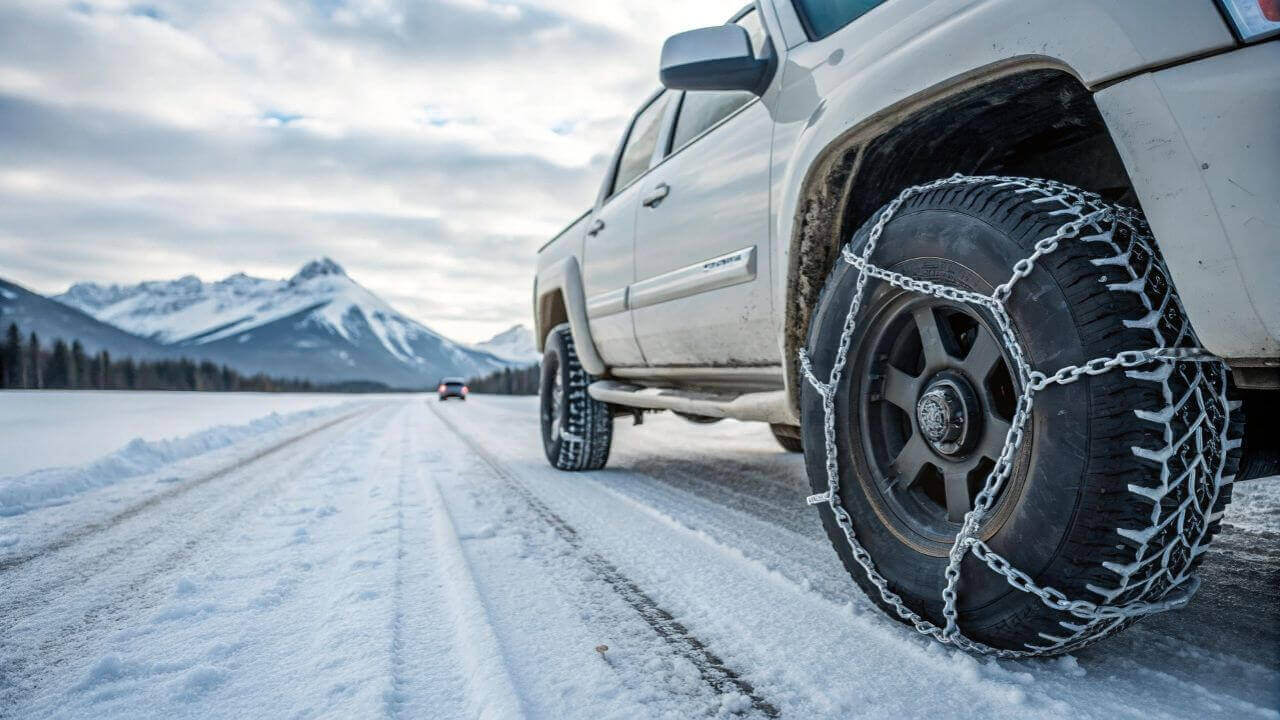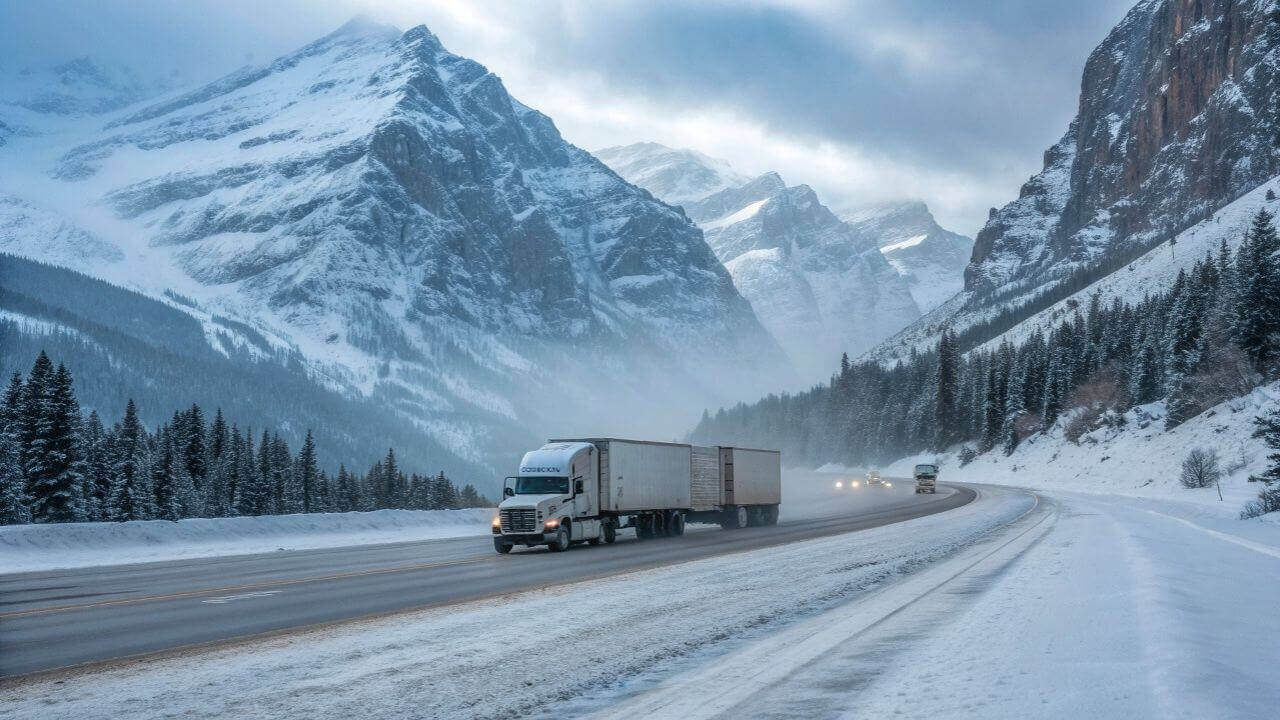Colorado truck citations I-70 chain laws aren’t just about tickets; they’re about survival on some of the most treacherous winter roads in America. Each year, drivers face fierce snowstorms, icy slopes, and sudden closures that turn I-70 into a nightmare. Ignoring these rules can trigger not only hefty Colorado chain law fines but also devastating accidents that ripple through communities and families.
When trucks weighing 80,000 pounds lose control, the consequences are massive. That’s why I-70 chain law enforcement and Colorado traction law requirements exist. They safeguard drivers, prevent unnecessary Vail chain law fines / Vail truck citations, and reduce liability in accidents. Understanding these laws may be the difference between safety and catastrophe.
Why Chain Laws Matter in Colorado’s Harsh Winters
Colorado winters transform highways into icy traps. Trucks and cars face slippery passes, sudden snowstorms, and black ice, especially along I-70. When heavy trucks lose traction, the results can be devastating. That’s why Colorado winter driving laws and chain requirements exist. They help vehicles grip the road, stop faster, and avoid jackknifing.
Local governments also step in. Vail chain law fines / Vail truck citations are issued to keep ski traffic safe and prevent pile-ups. Enforcement keeps the roads open as thousands of drivers trek into the highlands. Without these rules, I-70 winter closures Colorado would be far more frequent and dangerous.
Overview of Colorado Chain Laws
Chain laws apply differently depending on the type of vehicle. The Colorado DOT chain law (CDOT chain law) was introduced in 1996 and remains one of the strictest in the nation. It governs both commercial trucks and passenger cars, with fines for anyone who ignores the rules.
Colorado traction law requirements specify when drivers must use chains or traction devices. These vary by season and location. Role of CDOT in enforcing chain laws is critical; patrols monitor high-risk zones, especially the Eisenhower Tunnel and Vail Pass. If you skip compliance, you’ll face Colorado chain law fines and higher liability if an accident occurs.
Passenger Vehicle Traction and Chain Requirements
For smaller vehicles, the Colorado passenger vehicle chain requirements are clear. All-wheel drive, snow tires, or Colorado-style chains for passenger vehicles are essential during storms. Tire tread must be at least 3/16”. Without these, driving is illegal on restricted roads.
When vehicles slide, accidents rise fast. Failure to comply creates liability issues. Courts often treat this as evidence of negligence in truck accident lawsuits or car claims. If you’re a passenger driver without chains, you could face chain law violation penalties and become partly responsible under comparative fault in Colorado truck accidents.

Colorado Commercial Vehicle Chain Law
Trucks have tougher requirements. The commercial vehicle chain law Colorado applies to vehicles over 16,001 pounds or designed to carry 16 or more passengers. These trucks must carry and use chains during designated periods, especially on I-70.
Violations often lead to colorado truck citations i-70 chain tickets. Drivers who are discovered without equipment risk severe penalties, delays, and legal repercussions in crashes. A study by CDOT showed I-70 chain law enforcement reduces winter road closures. Still, many companies ignore rules, exposing themselves to chain law violation liability for trucking companies.
Penalties for Ignoring Chain Laws in Colorado
The cost of ignoring these laws is high. Basic Colorado chain law fines start at hundreds of dollars. If your violation causes a highway closure, fines can reach thousands. Vail truck citations and Vail chain law fines are frequent in places like Vail.
The table below shows the penalties:
| Violation | Fine | Extra Costs |
| No chains when required | $579 | Possible towing |
| Blocking road without chains | $1,157 | Liability for cleanup |
| Closure caused by violation | $2,000+ | Increased accident liability |
These aren’t just numbers. Ignoring the law brings lawsuits, insurance hikes, and legal consequences of chain law violations that go beyond fines.
Truck Liability in Chain Law Violation Accidents
Truck accidents often cause catastrophic damage. When chain laws are broken, courts see it as evidence of negligence in truck accident lawsuits. That means truck accident liability Colorado cases can quickly favor injured victims.
Employers can’t hide either. Employer accountability and truck driver recklessness are closely related. Companies must train drivers and provide equipment. If they fail, chain law violation liability for trucking companies puts them directly in the spotlight. Victims then file Colorado truck accident personal injury claim cases for medical bills and lost income.
Factors Contributing to Accidents Involving Chain Law Violations
Accidents happen for many reasons. Trucks without tire chains for snow in Colorado often lose traction, causing jackknifes, rollovers, or pile-ups. Snow and freezing rain shorten stopping distances. Without chains, trucks can’t brake in time.
In many cases, expert testimony helps. Accident reconstruction in chain law cases explains how traction failures, poor training, or worn tires caused the crash. Courts use these facts to decide how courts determine truck liability in accidents, often shifting blame fully onto the trucking company.
Legal Consequences for Truck Drivers and Employers
The legal fallout is serious. Drivers face fines, license points, and even criminal charges if negligence leads to deaths. Employers risk lawsuits, penalties from the FMCSA, and costly settlements. Commercial trucking regulations Colorado make clear that safety equipment is non-negotiable.
Beyond courtrooms, insurance becomes a nightmare. Insurance complications after chain law accident often leave companies paying out-of-pocket. Victims file claims, and insurers may deny coverage if chains weren’t used. Some cases also lead to chain laws and wrongful death lawsuits Colorado, where damages reach millions.
Protecting Your Rights After a Chain Law Accident
If you’re in a crash, act fast. Make a police call, get medical attention, and take pictures of the scene. You can bolster your claim with pictures of vehicles, weather, and tire markings.
Hiring a semi-truck accident attorney Denver is key. They know how courts determine truck liability in accidents and use expert analysis. Many lawyers even offer a free consultation Denver truck accident lawyer to guide you. For helpful resources on protecting your vehicle, you can also visit GoTechAnic.
Contact Fuicelli & Lee Injury Lawyers Today
After a crash, victims need guidance. Fuicelli & Lee offers strong representation in truck accident negligence Colorado cases. They understand Colorado truck driver regulations and how to hold companies accountable.
With decades of experience, they use carelessness evidence to support their claims in truck accident cases. For a free consultation with a Denver truck accident attorney, give them a call. Their team helps you secure compensation and navigate the legal system.
For further reading on traffic law and safety, you may visit Colorado DOT and FMCSA.
FAQs:
- Are chains required on I-70 in Colorado?
Yes. From September 1 to May 31, chains are required for commercial trucks on I-70 during snow events, and passenger vehicles must meet traction or chain laws when activated. - What is the new chain law in Colorado?
The updated law strengthens Colorado traction law requirements, making it mandatory for all drivers on I-70 between Morrison and Dotsero to carry proper traction devices during winter months. - Can I drive in Colorado without chains?
Only if conditions are clear. Once traction or chain laws are active, driving without chains or approved tires can lead to Colorado chain law fines. - Do tire socks count as chains in Colorado?
Yes, but only CDOT-approved tire socks qualify as passenger vehicle traction devices Colorado. They’re legal alternatives to traditional chains. - What happens if you don’t use chains in Colorado?
Drivers face steep chain law violation penalties, including fines up to $1,157, and if they block the highway, even higher. It also increases liability in accidents.


